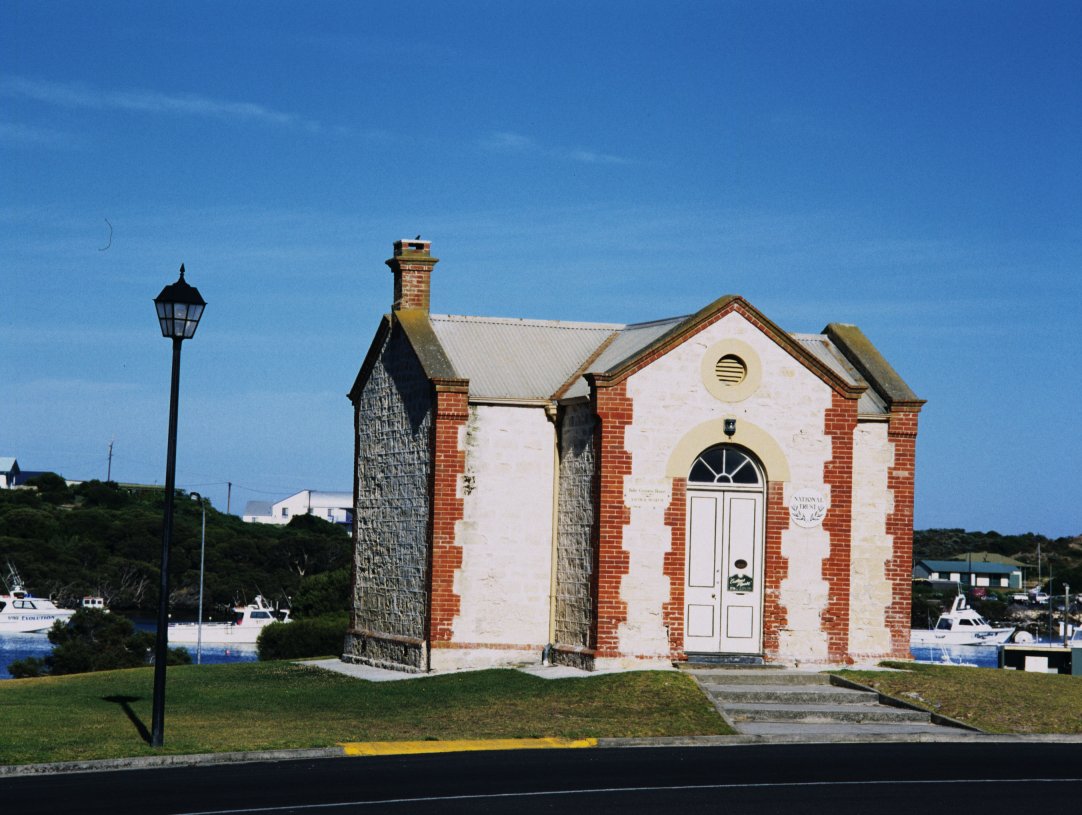The District Council of Robe was proclaimed on 28th October 1869. After rapidly progressing to be an important and busy sea port in the 1850's-60's Robe declined to become a remote and quiet village, still with many of its early buildings standing. It appears that in spite of its decline, Robe has always been popular as a place of beauty and relaxation, but Robe's charm has resulted in its becoming more and more popular and is now a major tourist town and in recent years a popular retirement centre.
"The little township of Robe, founded as an English Village on the shores of Guichen Bay is unique in the southern seas ......."
Robe's distinctive charm - a rare combination of old fashioned town, dense bush, wild ocean and quiet lakes - has long been appreciated.
Robe's coastline was explored by Captain Matthew Flinders and Nicolas Baudin in 1802, and Robe was founded by the South Australian Government as a seaport and village in 1846. The Province of South Australia itself had been first settled only ten years earlier.
It was the first town of any significance to be established in the south eastern portion of the colony. Greytown on Rivoli Bay had been surveyed a few months earlier and was the site of a small settlement but, Robe as the first centre of administration, was the focus of public and commercial life in the region.
 |
Robe was the major shipping service of the South East for the first twenty years of its existence, serving a hinterland that extended as far as Tatiara and the Victorian border. Most of the wool produced in the district left through its harbour and most imports entered in Guichen Bay which was also the site of numerous shipwrecks. |
It was the first active port in the South East. During this period Robe became an international port: at a time when most other ports in South Australia exported through Port Adelaide, Robe was trading directly with London. Great prosperity and the erection of many buildings occured between 1857 and 1863 when 17,000 Chinese landed at Robe and walked to the Victorian Goldfields, bringing an estimated 16,000 pounds into the Robe economy.
The port declined rapidly after the 1860's, as a result of this decline and a poor economy, a large portion of the old town has been preserved so that 84 historic buildings and sites remain. In terms of the number of historically important buildings recognised by the National Trust, Robe ranks foremost in South Australia. Robe is also listed as one of the State's historical towns in the Heritage Conservation Branch's Master Interpretation Plan.
Chairperson
1869, part of 1870 W McLean
Part of 1870 James Trego Williams
1871 Charles Gell
1872 J Law
1873 Henry Wylie
1874 Charles Gell
1875 J Law
1876 Arthur Banks
1877 Charles Gell
1878 J Hoston
1879, 1880 WH Young
1881 Thomas Pickett
1882 H Giles
1883 J Hoston
1884 S Reid
1885 J Hoston
1886 Charles Savage
1887
1888 Arthur Banks
1889
1890
1891
1892
1893 Andrew Munro
1894 Levi Cooper
1895-1898 William Moule
1899 Thomas Brigland
1900, 1901 James Nunan
1913, 1914 Charles Savage
1915, 1916 Henry James McConville
1916, 1917 Samuel Fletcher
1919, 1920 Samuel Fletcher
1920-1922 Benjamin John Davidson McBain
1922, 1923 Andrew Robinson
1924
1925
1926
1927
1928, 1929 Andrew Robinson
1930
1931
1932
1933, 1934 James Nunan
1935
1936, 1937 Eric James Banks
1938
1939
1940, 1941 Eric James Banks
1941-1943 Ronald Keith Stewart
1943-1946 Eric James Banks
1946-1948 John Hoctor Ryan
1948, 1949 Herbert Daniel Flint
1950
1951
1952, 1953 Herbert Daniel Flint
1953, 1954 George Francis Gough
1954, 1955 Eric Ronald Cawthorne
1956
1957, 1958 Eric Ronal Cawthorne
1958-1960 Alfred Stanhope
1960, 1961 Robert George Powell
1962
1963
1964
1965
1966
1967
1968, 1969 Robert George Powell
1969-1971 William John Quinlan-Watson
1971-1973 Brian James Thompson
1973, 1974 William John Quinlan-Watson
1975
1976
1977
1978
1979
1980
1981
1982, 1983 Patrick Raymond Enright
1984
1985
1986, 1987 Patrick Raymond Enright
1987, 1988 John Desmond Sale Rudd
1989
1990, 1991 John Desmond Sale Rudd
1991-2000 Kenneth John Hurst
Mayors
2000-2003 Anne Hayes
2003-2006 Peter Darr
2006-2010 William Peden
2010-2018 Peter Riseley
2018-2022 Alison Nunan
- 2022- current Lisa Ruffell
